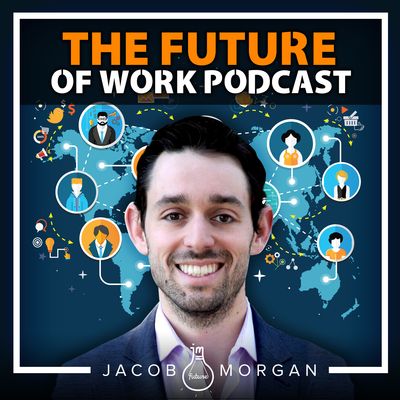Jacob Morgan is a best-selling author, speaker, and futurist who explores what the future of work is going to look like. The goal of the show is to future-proof your career and your organization by giving you the insights you need to adapt to how the workplace is changing. Jacob accomplishes this by sitting down with Chief Human Resource Officer, CEOs, CIOs, and other business leaders to explore topics ranging from technology, millennials, workplace design, employee experience, collaboration, the freelance economy, human resources, careers, and much more. This will be your go-to podcast for understanding how the world of work is changing! Intro and outro music by the amazing Ronald Jenkees!
https://thefutureorganization.com
How Learning, Education and Language Play Into the Future of Work
Click Here to Subscribe via iTunes
Click Here to Subscribe via RSS Feed (non-iTunes feed)
http://traffic.libsyn.com/futureofworkpodcast/Arthur20John20Hass20Podcast_DONE.mp3John Hass is the Chairman, President and CEO of Rosetta Stone, a language and literacy company with around 1,000 employees in the U.S. and around the world. Prior to Rosetta Stone, Hass spent two decades at Goldman Sachs both in New York and in Chicago. He was in the advisory part of the company working with Fortune 500 companies around the world on strategic initiatives.
Learning another language has a lot of benefits, whether you are taking a language class in school as a 4th grader or whether you are learning some key phrases in another language for business purposes as a 40 year old. Some of the impacts that go beyond just learning another language, are creating a cultural awareness, inspiring empathy and rewiring your brain to make it easier for you to learn in general.
Hass says learning another language is, “a demonstration of a willingness to meet someone halfway, when you’re working with someone cross border, cross culturally, your willingness to speak their language, to be part of their environment, is always very well received in business, in culture, in travel and in most of what we do. It’s a very powerful, powerful tool, but it’s an incredibly rewarding tool as well.”
When asked about the changing nature of learning in general, Hass brought up a staggering statistic regarding newly graduating high school students. He said that according to the former United States Secretary of Commerce, students currently in high school will change jobs 10 to 16 times throughout their career. Because of that, learning has to adapt to prepare these students for the world of work they are entering. Education needs to prepare students to be flexible, adaptable and it has to give them a broader set of skills.
Hass is a huge believer in perpetual learning. He understands the importance of lifelong learning and says, “you have to love to learn, you have to be willing to learn. Your learning can’t end when you graduate with whatever final degree you have. You have to continue to learn to be successful.”
Another important aspect about the future of learning is personalized learning. It is not good enough anymore to have one teacher standing in front of 30+ kids teaching them all the same material, at the same rate, and in the same format. Hass believes that AI and other technology will play a huge role in the future of personalized learning and allowing students to learn at their own pace and in a way that makes the most sense for their abilities.
Hass admits that he is not an expert in robots or automation, however when asked about his take on robots in the future of work, he says this really goes along with his beliefs about the future of learning. We have to broaden our skill-set and improve our flexibility. He sees robots and automation replacing jobs in industries he never would have expected in the past, and he believes we are only at the forefront of this move towards automation, so we need to be prepared.
Hass’s advice for the audience, especially the younger people just about to enter the workforce, is to look for new ways to learn, love to learn and always continue to learn. Find great sources that allow you to continue learning throughout your professional career.
What you will learn in this episode:
● What benefits come along with learning a new language
● John’s take on the changing nature of learning
● Who is responsible for learning? Individuals, Companies, or Schools?
● What technology Rosetta Stone is using
● A look into Rosetta Stone’s corporate culture
● What does personalized learning look like
● John’s view on robots and automation in the future of work
Links from the episode:
My new book, The Employee Experience Advantage (Wiley, March 2017) analyzes over 250 global organizations to understand how to create a place where people genuinely want to show up to work. Subscribe to the newsletter here or become a member of the new Facebook Community The Future If… and join the discussion.
The post How Learning, Education and Language Play Into the Future of Work appeared first on Jacob Morgan.
